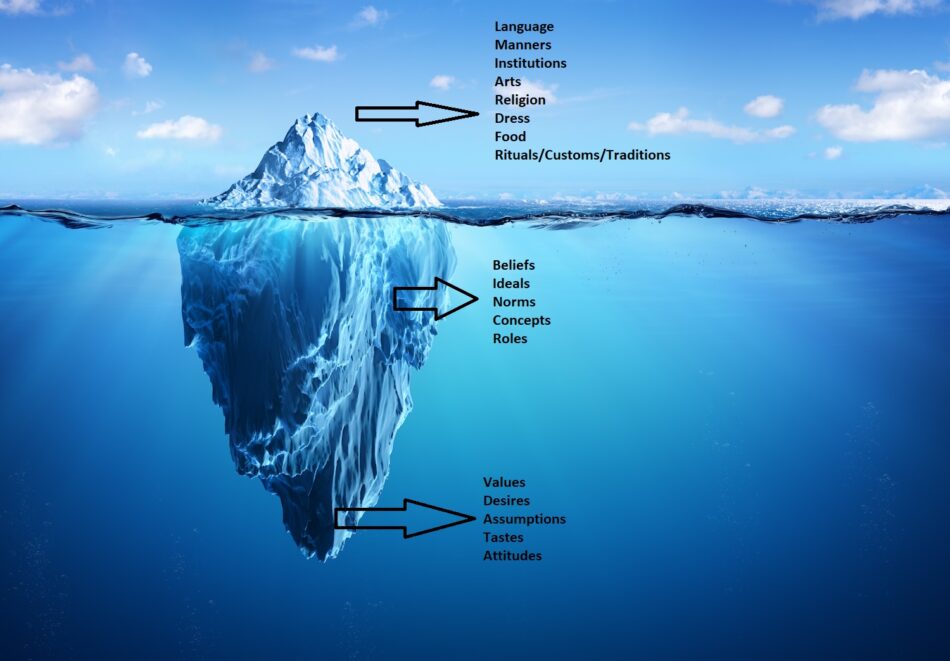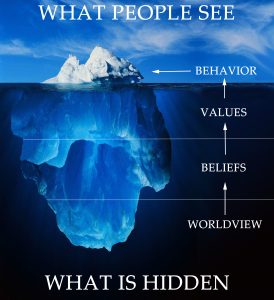
Page Description
‘The tip of the iceberg’ reveals hidden depths in complex situations, emphasizing the need for deeper investigation to grasp their full significance.
Introduction: The Hidden Depths of Reality
When we think of an iceberg, we often imagine only the small, visible portion that floats above the surface. Yet, the vast majority of an iceberg lies hidden beneath the water, unseen and often far larger than the part we can observe. This powerful metaphor applies not only to nature but also to our understanding of the world around us, especially when it comes to institutions, systems, and the stories we are told.
In the same way, many aspects of life – whether in the justice system, societal structures, or personal experiences – are shaped by what remains hidden from view. The labels and images we encounter are often only the tip of the iceberg, masking the deeper, more complex truths lying below. The real impact of these hidden truths can go unnoticed until the surface cracks, revealing a far more troubling reality beneath.
As we explore these hidden depths, we’ll examine how the trusted labels we assign to people, institutions, and stories can sometimes fail to reflect the reality that exists beyond them. What happens when these surface-level perceptions are proven false? What are the consequences when the truth is obscured by what we think we know?
Introductie: De Verborgen Diepten van de Werkelijkheid
Wanneer we aan een ijsberg denken, stellen we ons vaak alleen het kleine, zichtbare gedeelte voor dat boven het water uitsteekt. Toch ligt het overgrote deel van een ijsberg verborgen onder het wateroppervlak, onzichtbaar en vaak veel groter dan het deel dat we kunnen zien. Deze krachtige metafoor geldt niet alleen voor de natuur, maar ook voor ons begrip van de wereld om ons heen, vooral als het gaat om instellingen, systemen en de verhalen die ons verteld worden.
Op dezelfde manier worden veel aspecten van het leven – of het nu gaat om het rechtssysteem, maatschappelijke structuren of persoonlijke ervaringen – gevormd door wat verborgen blijft voor ons oog. De labels en beelden die we tegenkomen, zijn vaak slechts het topje van de ijsberg en verbergen de diepere, complexere waarheden die daaronder liggen. De werkelijke impact van deze verborgen waarheden blijft vaak onopgemerkt, totdat het oppervlak barst en een veel verontrustender werkelijkheid aan het licht komt.
Terwijl we deze verborgen diepten verkennen, zullen we onderzoeken hoe de vertrouwde labels die we toekennen aan mensen, instellingen en verhalen, soms niet de werkelijkheid weerspiegelen die daarachter schuilgaat. Wat gebeurt er wanneer deze oppervlakkige percepties als onjuist worden bewezen? Wat zijn de gevolgen wanneer de waarheid wordt verduisterd door wat we denken te weten?
1 Justice as Fragmentation: The Limits of Words
In the justice system, fairness and truth are often seen as the foundational pillars. Yet, in practice, the tools we use – words – fall short of representing the full reality of human behavior in complex situations. What truly happens is reduced to fragmented accounts, expressed through language that is understood rationally.
However, rational understanding cannot fully capture the profound emotions and experiences felt deep within a person living through those moments. What you feel when you endure an injustice cannot be equated to what someone else comprehends when they hear about it secondhand. These are fundamentally different dimensions of human experience.
This disconnect reveals a critical limitation: justice, as it is practiced, can be like the blind leading the blind. Without direct experience or the capacity to fully empathize, a gap remains between the person’s lived truth and how it is interpreted and judged.
Further complicating this is the role of conscience. Someone once spoke to me about the “natural conscience” versus the “formed conscience” (in Dutch, het gevormd geweten). If a person has never faced a particular situation, they cannot fully understand what it means to endure it. Without seeing it firsthand, they cannot truly experience it.
2 The Fragility of Justice: When Innocence Becomes a Target
A profound danger within any justice system is the potential to ensnare individuals who bear no connection to the alleged wrongdoing. Whether due to systemic flaws, circumstantial misinterpretations, or the biases inherent in human judgment, even the most innocent can find themselves thrust into the machinery of justice.
The cases I explore on this site reveal patterns that make us pause and question. How does someone with no reason, origin, or cause to be implicated become the focus of legal scrutiny? These stories expose the unsettling truth: justice is not immune to error, and the consequences of such errors can be devastating.
What’s particularly alarming is that the very tools of justice – designed to uncover truth – can instead obscure it. When decisions are based on fragmented accounts, assumptions, or circumstantial evidence, the system risks constructing a reality that does not reflect the actual events. In such cases, the system does not merely fail; it actively perpetuates harm.
This is not just a theoretical issue; it is a lived reality for countless individuals. It underscores the need for vigilance, not only from those within the system but also from society at large, to question, to demand transparency, and to advocate for reforms that prioritize fairness and truth above expediency or self-preservation.
3 The Danger of False Narratives: From Fiction to Injustice
One of the most unsettling aspects of human society is how easily a false image can take root and become widely accepted as truth. A striking example is Maria Mosterd’s book, Echte Nederlanders eten geen kaas (Real Dutch People Don’t Eat Cheese). Marketed as a “true story,” it sold 275,000 copies and was embraced by organizations advocating against loverboys. For a time, it was unquestioned – a bestseller seen as a harrowing account of victimhood.
Then, in an instant, the illusion was shattered. Investigative journalist Peter R. de Vries delved into her story, uncovering that it was pure fiction. His television exposé laid bare how a fabricated narrative can gain legitimacy and influence, only to be punctured (doorprikt) when subjected to scrutiny. The collective shock raised an important question: how can something that never happened come to be seen as real, shaping public perception and policy?
This phenomenon is not confined to isolated cases. Liam Allan, whose wrongful prosecution was the catalyst for this website, endured the weight of a justice system that believed a false image over the truth. The British Post Office scandal – a case of epic proportions – saw over a thousand innocent subpostmasters accused, prosecuted, and convicted based on flawed software and unrelenting institutional denial.
In each of these instances, the danger lies not only in the creation of a false narrative but in the unwillingness – or inability – of society and systems to question it until it is too late. The consequences extend far beyond the individual victims, eroding trust in justice, truth, and the institutions meant to uphold them.
These cases remind us of the critical need to question and scrutinize, to demand evidence, and to resist the allure of a compelling story that may, in fact, be untrue. Without this vigilance, we risk perpetuating harm and enabling a reality where truth becomes secondary to perception.
4 The Power and Peril of Institutions: When Trust Turns to Betrayal
The British Post Office, a name synonymous with trust, has existed since 1660 – predating the very establishment of the United Kingdom by 47 years. For over three centuries, it has been regarded as one of the nation’s most trusted brands. Yet, behind this façade of reliability lay a dangerous reality, described by Lord James Arbuthnot as a “dangerous dog” unleashed on those who dared to challenge it.
One of the most insidious aspects of this case was the institutional silence and denial. Subpostmasters, who turned to the Post Office helpline for assistance, were consistently told, “You are the only one.” This deliberate isolation masked the widespread nature of the scandal and ensured that individuals, already powerless, were left to face the Post Office’s unlimited resources and unyielding aggression alone.
At the heart of this betrayal were figures like Paula Vennells, a senior executive and also a priest in the Anglican Church. Her dual roles of corporate leader and religious figure only deepen the sense of disillusionment. How could someone who preached compassion and moral responsibility preside over an institution that systematically destroyed lives through lies and denial?
The human cost of this institutional failure is laid bare in Seema Misra’s haunting words in the foreword to Nick Wallis’s book. Wrongly convicted and imprisoned, she was driven to the brink of suicide. Her story is a profound reminder of how easily lives can be shattered when individuals are caught in the machinery of a system that values self-preservation over truth and justice.
Seema Misra’s ordeal, like those of so many others, forces us to confront an uncomfortable truth: even the most trusted institutions are capable of betrayal. It compels us to think deeply about how such systemic failures can occur and what it means for the ideals of justice and fairness.
5 The Fragility of Trust in Institutions and Individuals
In life, trust is often not a choice but a necessity. We cannot verify everything, nor can we live in perpetual doubt about those who hold authority – whether they are police officers, priests, or prosecutors. Yet, this reliance is also a vulnerability, as the trust we place is only as strong as the conscience and integrity of the individuals involved.
Take, for instance, Adam Foss’s powerful TED Talk, where he recounts his experience as a young prosecutor with Christopher’s case. Foss vividly describes the moment of realization:
“At the risk of sounding dramatic, in that moment, I had Christopher’s life in my hands. I was 29 years old, a brand-new prosecutor, and I had little appreciation for how the decisions I would make would impact Christopher’s life.”
Foss chose to see Christopher as a human being rather than just a case file. His compassion and understanding changed the course of Christopher’s life, leading to gratitude and transformation:
“Christopher thanked and hugged the prosecutor and said, ‘You cared about me, you changed my life.’”
But not every individual in the system acts with such awareness or humanity. The same power that Foss used to change a life can just as easily destroy one in the hands of someone without conscience or empathy. A police officer, sworn to uphold the law (‘een beëdigd ambtenaar’ in Dutch), is trusted to act with fairness. A priest is seen as a moral guide, embodying honesty and compassion. Yet, as history and countless cases reveal, these roles are not always aligned with the reality of the individuals who occupy them.
This disconnect is akin to the proverbial “tip of the iceberg.” What lies beneath the surface – hidden motives, biases, or systemic flaws – is often unseen until it’s too late. Trusting in the image of a role or institution can be perilous when that trust is misplaced.
The justice system, in particular, exemplifies this fragile balance. A single prosecutor’s decision can mean the difference between freedom and a lifetime of consequences. Foss’s story is a beacon of hope, but it also underscores a stark reality: the outcomes of justice often hinge on the character of individuals within the system.
For every Adam Foss, there are countless others whose lack of empathy, understanding, or integrity perpetuate harm. This dependence on the morality of individuals within powerful institutions is a glaring vulnerability – one that demands greater scrutiny, accountability, and awareness from society as a whole.
6 Silence Amidst Doubt: The Case of the Schiedammer Park Murder
Hundreds of experts knew about judicial errors’.
The Hague, the Netherlands
During working visits and courses at the Netherlands Forensic Institute, hundreds of criminal law experts discussed the investigation into the murder of Nienke Kleiss from Schiedam. The Advocate General who dealt with the case on appeal on behalf of the Public Prosecution Service also followed such a course.
This is what Minister of Justice Donner wrote in response to questions from the Lower House.
The advocate general then requested a meeting with the NFI. However, this did not change the prosecution’s opinion. Although experts from the NFI doubted whether the suspect Kees B. could be the perpetrator, he was nevertheless convicted of the murder. No DNA of Kees B. was found on the girl Neinke.
According to Donner, without the confession of Wik H., the ultimate perpetrator, four years after the murder, it would probably never have come to light that B. was innocent.
None of the more than 700 trainees from the judiciary, prosecution and police sounded the alarm in response to the doubts expressed by the NFI, Donner reported. The Minister does not intend to take measures himself against the employees who made mistakes. Today, the Lower House is holding an urgent debate on the Schiedammer Park murder.
‘Honderden experts wisten van missers justitie’
Den Haag
Honderden strafrechtexperts hebben tijdens werkbezoeken en cursussen op het Nederlands Forensisch Instituut het onderzoek naar de moord op Nienke Kleiss uit Schiedam besproken. Ook de advocaat-generaal die namens het openbaar ministerie de zaak in hoger beroep behandelde, volgde zo’n cursus.
Dat schrijft justitieminister Donner in antwoord op vragen van de Tweede Kamer.
De advocaat-generaal vroeg daarop een gesprek aan met het NFI. Dat veranderde de opvatting van deze aanklaagster echter niet. Hoewel experts van het NFI betwijfelden of de verdacht Kees B. de dader kon zijn, werd hij toch voor de moord veroordeeld. Op het meisje Neinke was geen DNA van Kees B aangetroffen.
Volgens Donner zou zonder de bekentenis van Wik H., de uiteindelijke dader, vier jaar na de moord waarschijnlijk nooit aan het licht zijn gekomen dat B. onschuldig vast zat.
Geen van de meer dan 700 cursisten van justitie, openbaar ministerie en politie trok naar aanleiding van de door het NFI geuite twijfels aan de bel, meldt Donner. De minister is niet van plan zelf maatregelen te nemen tegen de medewerkers die fouten hebben gemaak. De Tweede Kamer houdt vandaag een spoeddebat over de Schiedammer Parkmoord.

The Schiedammer Park murder in the Netherlands reveals the devastating consequences of silence in the face of doubt. Despite forensic experts at the Netherlands Forensic Institute (NFI) expressing uncertainty about the guilt of Kees B., no one within the judiciary, prosecution, or police took decisive action to challenge the flawed narrative. Over 700 trainees from these institutions encountered the case during courses or working visits, yet not a single alarm was raised.
This failure of accountability led to the wrongful conviction of Kees B., even though no DNA evidence linked him to the victim, Nienke Kleiss. It was only four years later, with the confession of the real perpetrator, Wik H., that the truth emerged. By then, the damage was done—an innocent man had been branded a murderer, and public trust in the justice system had eroded further.
The case underscores the critical importance of speaking out against errors, particularly when evidence raises serious questions. Silence, whether due to fear, complacency, or institutional pressure, perpetuates injustice and enables systemic failures. The Schiedammer Park murder serves as a sobering reminder that inaction in the face of doubt is as harmful as the original mistake.
Stilte te midden van twijfel: De zaak van de Schiedammer Parkmoord
De Schiedammer Parkmoord in Nederland onthult de verwoestende gevolgen van stilte in het licht van twijfel. Ondanks dat forensische experts van het Nederlands Forensisch Instituut (NFI) hun onzekerheid uitten over de schuld van Kees B., nam niemand binnen de rechtspraak, het Openbaar Ministerie of de politie de beslissende stap om het foutieve verhaal ter discussie te stellen. Meer dan 700 cursisten uit deze instellingen kwamen tijdens trainingen of werkbezoeken met de zaak in aanraking, maar niemand sloeg alarm.
Dit falen van verantwoordelijkheid leidde tot de onterechte veroordeling van Kees B., hoewel er geen DNA-bewijs was dat hem aan het slachtoffer, Nienke Kleiss, koppelde. Pas vier jaar later, met de bekentenis van de werkelijke dader, Wik H., kwam de waarheid aan het licht. Tegen die tijd was de schade al aangericht—een onschuldige man werd bestempeld als moordenaar, en het vertrouwen van het publiek in het rechtssysteem werd verder ondermijnd.
De zaak onderstreept het cruciale belang van het aankaarten van fouten, vooral wanneer bewijsmateriaal ernstige vragen oproept. Stilte, of het nu voortkomt uit angst, onverschilligheid of institutionele druk, houdt onrecht in stand en maakt systematische fouten mogelijk. De Schiedammer Parkmoord is een ontnuchterende herinnering dat inactiviteit in het licht van twijfel net zo schadelijk is als de oorspronkelijke fout.
7 Beyond the Exceptions: The Hidden Scale of Wrongful Convictions
The thousands of wrongly convicted individuals who are in prison are obviously much higher than the numbers mentioned in point 3. These are the people who were declared innocent after years or decades of wrongful imprisonment, and it is clear that they are only exceptions who achieve this (as we can see in the videos on the website).
8 The Key Points of “The Tip of The Iceberg” are
The phrase “the tip of the iceberg” is an idiomatic expression that is often used to describe a situation where a small or visible part of a problem or issue is apparent, but the larger, more significant part remains hidden or undisclosed. The key points of “the tip of the iceberg” are:
Surface appearance: “The tip of the iceberg” refers to the small, visible portion of a larger entity or issue that is readily apparent or easily seen. It represents the superficial or surface appearance of something.
Concealed depth: The idiom implies that there is a much larger, more complex or hidden part that is not immediately visible. The visible part is just the beginning, and there is much more beneath the surface that may not be readily apparent.
Incomplete understanding: “The tip of the iceberg” suggests that the information or knowledge available is limited and does not provide a comprehensive understanding of the entire situation. It indicates that there may be more to the story or issue that is not yet known or understood.
Warning sign: The idiom can also be used to caution that the visible part of a problem or issue is just the beginning and that there may be more serious or significant consequences lurking beneath the surface. It serves as a warning that there may be more to consider or address beyond what is immediately apparent.
Need for further investigation: “The tip of the iceberg” implies that further exploration or investigation is required to uncover the underlying or hidden aspects of a situation. It suggests that additional effort or inquiry may be needed to fully understand the extent or implications of a problem or issue.
Overall, “the tip of the iceberg” conveys the idea that there is more to a situation than meets the eye, and that further investigation or consideration is necessary to fully comprehend its scope, complexity, or significance.

A small, noticeable part of a problem, the total size of which is really much greater:
These small local protests are just the tip of the iceberg.
Cambridge Dictionary

Wrongful Conviction Explained
‘Post Office Scandal – The Tour’. BBC Breakfast – Nick Wallis and Wendy Buffrey. Tour details below
2 mrt 2024
Buy tickets here:
https://www.postofficescandal.uk/live…
Touring 2024:
March
Sat 23 March – Marine Theatre, Lyme Regis, Dorset, 1.30pm! Special guest: Tracey Merritt.
Sun 24 March – Garrick Theatre, Lichfield, Staffordshire, 7.30pm. Special guest: Harjinder Butoy.
April
Fri 12 April – Darlington Hippodrome, County Durham, 7.30pm. Special guests Lee Castleton and anonymous source “Clint“.
Sat 13 April – Crewe Lyceum, Cheshire, 7.30pm. Special guest: Scott Darlington and Damian Owen.
Sun 14 April – Theatre Severn, Shrewsbury, Shropshire, 2.30pm! Special guests: Rubbina and Mohamed Shaheen.
Sun 14 April – Theatre Severn, Shrewsbury, Shropshire, 7pm. Special guests: Tracy Felstead and Tim Brentnall. SOLD OUT!
Mon 15 April – The Civic, Stourport, North Worcestershire, 7.30pm. Special guest: Michael Rudkin.
Tue 16 April – The Regal, Evesham, Worcestershire, 8pm. Special guest: Wendy Buffrey.
Wed 17 April – The Abbey, Abingdon-on-Thames, Oxfordshire, 8pm. Special guest: Balvinder Gill.
Thu 18 April – Leatherhead Theatre, Surrey, 7.30pm. Special guest: Seema Misra.
Fri 19 April – Dudley Town Hall, West Midlands, 7.30pm. Special guest: Wendy Buffrey.
Sat 20 April – Barnfield Theatre, Exeter, Devon, 7.45pm. Special guest: Wendy Buffrey.
Sun 21 April – Launceston Town Hall, Cornwall, 11am! Special guest: Penny Williams
Sun 21 April – The Acorn, Penzance, Cornwall, 7.30pm. Special guest: Penny Williams.
Sat 27 April – South Mill Arts Centre, Bishop’s Stortford, Hertforshire, 7.30pm. Special guest: Tony Downey..
Sun 28 April – Palace Theatre, Southend, Essex, 7.30pm. Special guest: Graham Ward.
May
Fri 3 May – Riverhouse Barn Arts Centre, 8pm.
Sat 4 May – Ropetackle Theatre, Shoreham-by-Sea, West Sussex, 1pm. Special Guest: Sami Sabet.
Sat 4 May – Hailsham Pavilion, East Sussex, 7.30pm. Special guest: Sami Sabet.
Sun 5 May – Beck Theatre, Hayes, West London, 7.30pm. Special guest: Parmod Kalia.
Sat 11 May – Plough Arts Centre, Great Torrington, Devon, 8pm. Special guest: TBA.
Sun 12 May – Princess Theatre, Burnham-on-Sea, Somerset, 7.30pm. Special guest: Tim Brentnall.
Mon 13 May – Wyvern Theatre, Swindon, Wiltshire, 7.30pm. Special guest: Nicki Arch.
Tue 14 May – Tivoli Theatre, Wimbourne, Dorset, 7.30pm. Special guest: Sami Sabet.
Wed 15 May – Yvonne Arnaud Theatre, Guildford, Surrey, 7.30pm. Special guest: Seema Misra.
Thu 16 May – Chelmsford Theatre, Chelmsford, Essex, 7.30pm. Special guest: Graham Ward.
Baroness Minouche Shafik: What do we owe each other?
HARDtalk
The idea of a social contract between the individual and the state is a staple of political philosophy. But what happens when that contract is threatened by forces beyond the control of any government, like a climate crisis or, right now, a global pandemic? Stephen Sackur speaks to Baroness Minouche Shafik, director of the London School of Economics and former top official at the World Bank. Is humanity capable of collective action to meet global challenges?

Absurd Disappearing Woman Prank
21 mrt. 2014